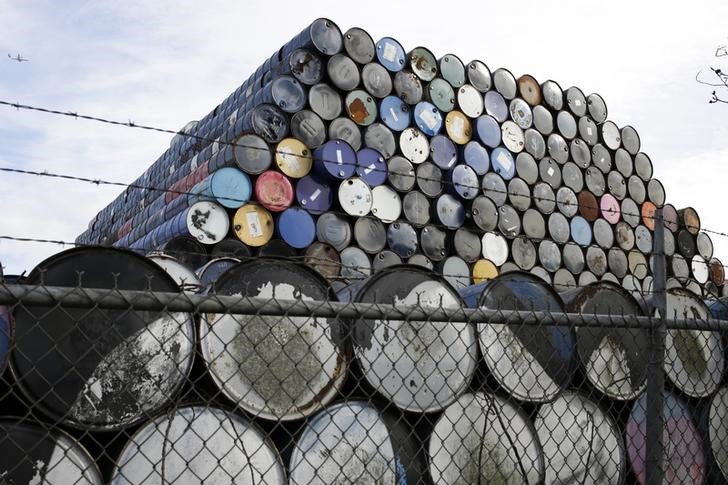Investing.com - U.S. crude oil inventories rose unexpectedly last week, according to official data released on Wednesday.
The Energy Information Administration said in its regular weekly report that crude oil inventories increased by 2.21 million barrels in the week to June 7.
That was compared to forecasts for a stockpile draw of 0.48 million barrels, after a surge of 6.77 million barrels in the previous week.
The EIA report also showed that gasoline inventories increased by 0.76 million barrels, compared to expectations for a gain of 0.74 million barrels, although distillate stockpiles fell unexpectedly by 1.0 million barrels, compared to forecasts for a build of 1.14 million.
U.S. crude prices extended losses after the release, sliding 3.0% at $51.66 a barrel by 10:34 AM ET (14:34 GMT), compared to $52.10 prior to the publication.
London-traded Brent crude futures slumped 2.7% to $60.62 a barrel, compared to $61.05 ahead of the report.
Oil prices were already registering sharp declines of around 2% ahead of the data on signs that a weakening global economy was pushing growth in demand for oil to its lowest in years.
The EIA already cut its forecasts for 2019 world oil demand growth on Tuesday, while analysts have also been downbeat on the outlook.
“Global oil demand growth is running at the weakest rate since 2012,” analysts at Bank of America (NYSE:BAC) Merrill Lynch said.
Analysts participating in a May Reuters oil survey had their most optimistic growth forecasts at around 1.4 million bpd, as against 1.7 million bpd in a January poll.
Fears of slowing demand amid worries of a global recession seem to have overtaken bullish supply-side factors such as OPEC-led production cuts or U.S. sanctions against producers Iran and Venezuela.
With OPEC and its allies widely expected to extend their output cut deal at the end of the month, Investing.com senior commodity analyst Barani Krishnan suggested that a visit from Japanese Prime Minister Shinzo Abe to Iran could represent another bearish threat for crude prices.
“The first Japanese premier to set foot on Iranian soil since the 1979 Islamic Revolution, Abe’s visit will be historical even without what he hopes to achieve: making peace between Tehran and the U.S. While U.S.-Iran tensions have rippled across the globe, the real repercussions felt by the world are oil prices that may be higher than warranted because of the face-off,” Krishnan explained.
“Iran’s oil exports alone are about a million barrels below capacity because of the U.S. embargo,” he explained.
Krishnan said that there is a “growing feeling” that U.S.-Iran nuclear negotiations could be announced.
“Few things could be more bearish for oil if that occurs,” he warned.
